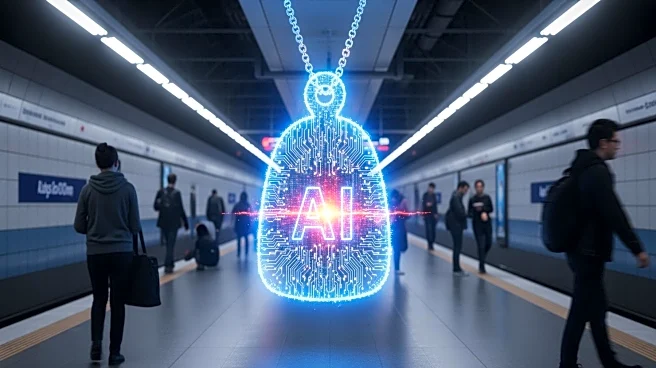What's Happening?
An advertising campaign for Friend, a wearable A.I. pendant designed to act as a digital companion, has been met with significant public backlash in the New York City subway system. The campaign, which
features posters describing Friend as 'someone who listens, responds and supports you,' has sparked intense reactions from commuters. Many of the advertisements have been defaced, with vandals writing 'A.I. is not your' across the top and crossing out the word 'friend.' This public response highlights a growing debate over the role of artificial intelligence in personal relationships and the perception of A.I. as a substitute for human interaction.
Why It's Important?
The backlash against the Friend A.I. pendant campaign underscores broader societal concerns about the increasing presence of artificial intelligence in everyday life. As A.I. technologies become more integrated into personal and social contexts, questions arise about privacy, authenticity, and the potential erosion of genuine human connections. This incident reflects a resistance to the commercialization of companionship and the ethical implications of relying on machines for emotional support. The reactions may influence future marketing strategies for tech companies and prompt discussions on the boundaries of A.I. in personal spaces.
What's Next?
The ongoing debate surrounding the Friend A.I. pendant may lead to further scrutiny of similar technologies and their impact on social dynamics. Companies involved in developing and marketing A.I. companions might need to address public concerns by enhancing transparency and ensuring ethical standards in their products. Additionally, this situation could prompt regulatory bodies to consider guidelines for advertising A.I. technologies, particularly those that claim to offer emotional or social benefits. Public discourse may continue to evolve as more individuals engage with the implications of A.I. in personal relationships.
Beyond the Headlines
The defacement of the Friend advertisements highlights a cultural resistance to the commodification of friendship and emotional support. This incident may provoke deeper discussions about the societal values associated with human interaction versus technological substitutes. It raises questions about the authenticity of relationships mediated by A.I. and the potential long-term effects on social behavior and mental health. As technology continues to advance, society may need to redefine the boundaries between human and machine interactions.










